It's probably the last thing that people suffering as a result of flooding will want to be ploughing through this evening, but for what it's worth, today's Commons debate is available to read here.
UK floods cause chaos - Monday 26 November
Live feed
The environment secretary, Owen Paterson, has denied that talks between the Association of British Insurers and the government over a new flood deal on insuring high risk problems.
Interviewed by Jon Snow on Channel 4 News this evening, he said that the government had inherited "an absolutely dire economic situation" from the last government.
Despite that, he said that the current government had put in place a £2.17m scheme to protect against flooding, as well as creating "very imaginative" partnerships with local government.
Regarding the the talks with the ABI, he said that he would not put a time on when an outcome might be reached and accused some people of being "opportunistic" today in the way that they raised the issue.
He added: "I want to continue our very constructive and serious discussions with the ABI to get to an agreement which is satisfactory to all parties."
Flood-hit communities are growing more anxious over the availability and affordability of flood insurance once the deal between the last government and insurance industry expires next June, claims Mary Creagh MP, Labour's shadow environment secretary.
In a statement issued this evening, she added:
The risk of flooding is the biggest threat that the UK faces from climate change yet the Tory-led Government has cut investment in flood defences by 27%.
Ministers need to get a grip on flood insurance and ensure high-risk homes are able to access the protection they need.
Coverage of flooding in North Yorkshire by Channel 4 News at 7pm has some bleak footage, as well as interviews with some residents who not entirely happy with the response of the local authorities.
One woman said that she was five months pregnant and felt that she had been left to her own devices by the authorities.
"I'm in no fit state to be carrying around sandbags," said Vikki Haw.
Another local resident claimed that local people were restricted to 10 sandbags each, a restriction that was "a matter of pennies".
The local council said that it was distributing sandbags fairly and that more were available on request.
An update now on the situation across England and Wales, as measured by the Environment Agency.
176 Flood Warnings, meaning that flooding is expected and immediate action is required.
283 Flood Alerts, meaning that flooding is possible.
A total of 184 Flood Warnings and Alerts that previously were in place have been removed in the last 24 hours.
This is Ben Quinn updating the blog now.
Summary
Here is a summary of today’s key points:
The south-west of England and the Midlands were recovering from serious flooding today as the bad weather headed north to north Wales and the north of England. Forecasters are predicting deluges today with up to 30mm expected in north Yorkshire, Teesside and County Durham. Across the country the flood risk remains high. Around 900 properties have flooded since Wednesday.
Major roads were closed near Middlesbrough and Hartlepool. Wetherby racecourse on the border between North and West Yorkshire was turned into a lake by rainfall and the nearby River Wharfe. The East Coast main line between York and Doncaster was closed. The south-west was not out of the woods yet, with the River Severn predicted to rise to 4.8m at hard-hit Tewkesbury, Gloucestershire, overnight or early tomorrow morning. All planned surgery was cancelled at a North Yorkshire hospital due to rising floodwater. Firefighters pumped water from the grounds of the Friarage Hospital in Northallerton after a nearby stream overflowed. Gale-force winds are likely to hit the northern coast of Cornwall, as well as the north east coast of England and parts of Wales.
Nearly 50,000 properties were protected by recently-built flood defences, the environment secretary, Owen Paterson, told the Commons.
The Met Office has issued amber rain warnings ("be prepared") for the following locations: North-east England, Wales, Yorkshire & Humber. Less-severe yellow warnings ("be aware") were issued for: East Midlands, London & south-east England, north-east England, north-west England, south-west Scotland, Lothian Borders, south-west England, Wales, West Midlands, Yorkshire & Humber.
Ben Bradshaw, the former Labour minister and MP for Exeter, criticised the government’s lack of investment in flood defences in the south west. The coalition cut flood defences nationally by over 25% when it took office, the Guardian’s Damian Carrington reminds readers. Paterson told the Commons the figure was only 6%. Meanwhile, in Wales, where Labour is in charge, Tory shadow ministers criticised the Welsh government’s budget cuts.
The government and the insurance industry are embroiled in a row over a deal they are trying to come to over the insuring of high-risk properties. The Association of British Insurers said talks had reached deadlock in the run-up to a deadline next year. The government denied it and said they had put a proposal on the table. The ABI denied this. Ministers also said the ABI was acting inappropriately in raising the issue right now.
The floods should be a "wake-up call on the need for urgent action" on climate change, Friends of the Earth said. Mary Creagh, the shadow environment secretary, said floods were the greatest threats that climate change posed to the UK.
Paterson says her detailed questions cannot be answered yet, while the weather is still bad.
The details of the Bellwin scheme are the same as they were under Labour, he says. But he might review that.
Paterson runs through arguments he has made earlier today about the insurance industry.
He says the government is reducing spending on flood defences by only 6%. Her figures are a "complete canard".
Creagh says floods are the greatest threats that climate change poses to our country.
What funding will he put in place for capital expenditure for damaged roads, she asks.
What support will the government give to those who are uninsured or underinsured, Creagh says. It has to be more than "warm tweets" from the prime minister.
She says a deal with insurers must be struck before the autumn statement in nine days.
She says every pound invested in flood defences is worth £8 further down the line.
She attacks government cuts to flood defences - 294 schemes have been deferred or cancelled, she says.
Creagh says just three of the 20 areas flooded last summer have reached the Bellwin threshold to get the extra government money.
She asks if Paterson has been in touch with the education secretary regarding children whose schools are flooded.
Creagh asks how much farmland is underwater and how many crops have been lost.
Mary Creagh, his Labour shadow, echoes the minister's thanks to the emergency services, and sends her condolences to those who have died.
The communities secretary will be activating the Bellwin scheme to free up money for local authorities, he says.
Nearly 50,000 properties have been protected by recently-built flood defences, Paterson says.
The train routes between Exeter and Taunton and Exeter and Yeovil are of great concern to Network Rail, he says.
He thanks the emergency services, local councils and the EA.
He assures the house that the EA and partners are working around the clock to prevent flooding in at-risk areas.
A great many people have been evacuated, and these numbers may increase, Paterson says.
Paterson talks about the people he has met today visiting the flood-hit areas.
He praises the EA and council staff.
He says he feels sorry for the people in Worcetershire whose properties were flooded when pumps failed.
The environment secretary says the Environment Agency has 197 flood warnings in place, he says. Three people have died.
Heavy rainfall is not unusual at this time of year, but we have experienced intense rainfall on "catchments" that were already saturated, Paterson says.
There is a continued risk of significant flooding in parts of north-east England and north Wales, he says.
Commons statement
Owen Paterson is giving a statement now on the floods in the Commons.
Tewkesbury
As river levels continue to rise, Tewkesbury council has opened a rest centre at its council offices on Gloucester Road, the Press Association reports.
While no properties have been evacuated, there are areas of concern in Tewkesbury, Maisemore and Sandhurst where river levels have not yet peaked. The rest centre, which is being set up as a precautionary measure, will be managed by the council's emergency management staff ...
The borough council is continuing to replenish its stock of sandbags, which are available at the entrance of the council offices. In addition, council staff are making as many visits as possible to homes likely to be badly affected by the rising river levels to make sure they are appropriately prepared and to advise them that the rest centre is available if needed.
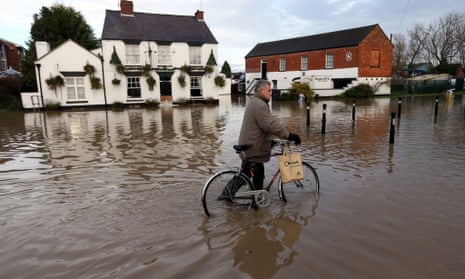
Hospital
Martin Wainwright has more on the Friarage hospital in Northallerton, North Yorkshire, where surgery has been cancelled for the day after there were drainage problems with three operating theatres.
The hospital car park is flooded but a high-powered pump has kept water from the central power unit and boiler room and other services and wards remain open. Nearby roads have been flooded after the Willow beck burst its banks.
Parts of central York impossible to defend against the river Ouse, which flows right through the middle of the city, have gone under as usual. The King's Arms in Kings Staith is a metre deep in water, which is being fed out through a pump using the pub's letterbox, while more water comes in a little lower down.
In Stokesley, North Yorkshire, a couple were rescued by paramedics from the bank of a swollen river and taken to the James Cook university hospital in Middlesbrough suffering from hypothermia. Road closures continue to rise including the Leeds-Harrogate commuter run at Pool-in-Wharfedale and the A6108 Richmond road linking to the A1M at Scotch Corner. The Met Office forecasts rain continuing overnight but at a lighter level than originally predicted, and clearing away tomorrow.
Photos
Here are a couple of flooding pictures from around the country:
FLOOD PIC: A photo of the flooding at Daw Lane Bridge near Doncaster. You can just about make out the top of the arch! ow.ly/i/1ax9v
— East Coast Trains (@eastcoastuk) November 26, 2012
Dad took a pic of the steps outside the library #flood #water #cool #ohno instagr.am/p/Sf7REqs8UT/
— elizabeth heath (@veryannxx) November 26, 2012
County Durham and Teesside
The rain has now hit County Durham and Teesside with a vengeance, Martin Wainwright reports, closing major roads near Middlesbrough and Hartlepool including the A19 between the A179 and the A181.
The River Wear has spilled over below Durham city centre, closing Framwellgate, and the A167 has closed between Pity Me and Plawsworth although it is still open at the Honest Lawyer pub. Increasing road disruption, mostly from standing water left by heavy and continuous rain, has led Durham police to urge all drivers to travel only if their journeys are absolutely necessary. Following suit, Teesside university campuses in Middlesbrough and Darlington have closed for the day with all events cancelled.
There are now 24 flood warnings and 42 flood alerts in the north east region, including Yorkshire, and one warning and 14 alerts in the north west. Much the highest tally is in the Midlands, with 87 warnings and 57 alerts as the rain tracks slightly further south than originally expected.
There was major alarm at Catterick in North Yorkshire where the A1M was closed northbound and traffic coming south also slowed to a crawl. The region saw huge disruption in September where the stretch close to the river Swale was shut for three days. But the road has now reopened after firefighters finished pumping work, although traffic is moving slowly.
Things are quieter in West Yorkshire but rivers continue to rise, swollen by heavy rain in the Pennine catchments, and there has been road disruption across the region, with some traffic trapped near Ripon between two flooded stretches of road.
The south
The bad weather is moving north today, but the south is not yet out of the woods. Heavy showers are forecast in Wiltshire, Dorset and central southern England, while gale-force winds are likely to hit the northern coast of Cornwall, as well as the north east coast of England and parts of Wales. The Press Association reports:
Up to 0.6in (15mm) of rain is expected to fall across the spine of Britain today, less than the 1.2in (30mm) of rain in pockets of the West Country or the 1.6in (40mm) to 2in (50mm) possible in the north and north Wales, but meteorologists said it would offer little respite to weary homeowners keen to begin the clean-up.
Motorists in Gloucestershire are being urged to continue driving with care as significant flooding is still affecting the county's roads. The Environment Agency is predicting river levels to swell overnight with the River Severn being of particular concern. The Severn is predicted to peak at Tewkesbury at 4.8m – a metre lower than the 2007 peak – overnight or early tomorrow morning.
Yorkshire
Wetherby racecourse on the border between North and West Yorkshire has been turned into a lake by rainfall and the nearby River Wharfe, forcing the cancellation of racing for the fourth time this year, reports Martin Wainwright.
A course inspection due at 2pm was cancelled because the staff would have needed dinghies and it was obvious that there was no chance of the meeting planned for Wednesday 28 November going ahead. The course previously lost meetings – and the high income earned from them – in January, February and April.
Racing due at Sedgefield in county Durham tomorrow, Tuesday 27 November, has also been cancelled.
Devon
Steven Morris has been speaking to flooding victim Keith Gibson in Kennford, near Exeter. "It's just one of those things. You just get on with it, don't you?" Gibson tells him.
Steve also spoke to another flooding victim, Les Seaton, in the same village. Seaton is not insured because his house is on a flood plain. "They won't insure us for floods ... Bit naughty, isn't it? They've been taking all your money all these years, and then out of the blue they stop it. And this is the year that we could have done with it."
Climate change
The floods should be a "wake-up call on the need for urgent action" on climate change, Friends of the Earth says.
The campaign group says the bad weather shows "how wrongheaded George Osborne is when he talks only about the costs of tackling climate change. The misery that thousands of families are experiencing today is a reminder of the far bigger costs we all face of failing to cut emissions."
The group's policy director, Criag Bennett, adds: “The government must show leadership and move quickly to slash UK emissions and help protect us all from the threat of increasing global climate change.”
Trains
The rain has caused the first major rail blockage in the north with complete closure of the East Coast main line between York and Doncaster and serious problems causing hour-long delays between Durham and Northallerton, reports Martin Wainwright.
The situation is clearly worsening as East Coast trains are now advising people not to travel north of Leeds today. Tickets will be valid tomorrow instead.
The Doncaster closure to all services - which does not affect London-Leeds trains - follows concern about floodwater scouring the foundations of a river bridge on the line.
Summary
Here is a summary of today’s key points so far:
The south-west of England and the Midlands were recovering from serious flooding today as the bad weather headed north to north Wales and the north of England. Forecasters are predicting deluges today with up to 30mm expected in north Yorkshire, Teesside and County Durham. Across the country the flood risk remains high. Around 900 properties have flooded since Wednesday. The government will make a statement on the flooding in the Commons this afternoon.
The Met Office has issued amber rain warnings ("be prepared") for the following locations: North-east England, Wales, Yorkshire & Humber. Less-severe yellow warnings ("be aware") were issued for: East Midlands, London & south-east England, north-east England, north-west England, south-west Scotland, Lothian Borders, south-west England, Wales, West Midlands, Yorkshire & Humber.
Ben Bradshaw, the former Labour minister and MP for Exeter, criticised the government’s lack of investment in flood defences in the south west. The coalition cut flood defences nationally by over 25% when it took office, the Guardian’s Damian Carrington reminds readers. Meanwhile, in Wales, where Labour is in charge, Tory shadow ministers criticised the Welsh government’s budget cuts.
The government and the insurance industry are embroiled in a row over a deal they are trying to come to over the insuring of high-risk properties. The Association of British Insurers said talks had reached deadlock in the run-up to a deadline next year. The government denied it and said they had put a proposal on the table. The ABI denied this. Ministers also said the ABI was acting inappropriately in raising the issue right now.
All planned surgery was cancelled at a North Yorkshire hospital due to rising floodwater. Firefighters pumped water from the grounds of the Friarage Hospital in Northallerton after a nearby stream overflowed. An NHS spokesman said three theatres had been closed due to drainage issues, resulting in 10 operations being cancelled.
Leeds
Martin Wainwright sends this video of rainwater in Leeds. "The weather here in West Yorkshire, in Leeds, is not very spectacular, but it's cumulative ... All the time, round here, the rain is falling down slowly. It's not torrential, it's just very, very steady. The ground is saturated. It's all going down the valley into the River Aire. And thus flooding is happening, which could, if it carries on for too much longer, affect the centre of Leeds, and other parts of the north."
Devon
Exeter's MP, Ben Bradshaw, has been criticising what he sees as the government's lack of investment in flood defences on his patch, writes Steven Morris from Devon.
In his blog the former Labour minister said the city escaped major flooding this time “by a whisker”. He said the upgrading Exeter's 1960s flood defences was being held up by the failure of central government to fund the scheme.
On transport, Bradshaw said Exeter and the west country had “essentially been cut off since Wednesday for rail travel”. He called on the government to work with Network Rail to improve the “resilience” of the west's rail connections.
Later, on BBC Radio Devon, Bradshaw argued that problems like the lack of rail services – the line has been flooded and damaged - put off businesses from investing in the south-west. He said that the lines were being hit by heavy rain far more often and claimed that if lines in the south-east of England repeatedly flooded work would already have been done to sort the issue out.
The Conservative leader of Devon council, John Hart, also joined in, calling on the government for help in sorting out the aftermath of the floods.
Councillor Stuart Hughes, who has the highways portfolio on the county council, suggested that local authorities ought to get flood relief money – Devon has benefited from winter relief following harsh winters.
Local authorities across the west are worried that if, as expected, the weather turns colder later this week, huge damage could be caused to roads as water lying in potholes and cracks freezes.
Visiting Devon, Patterson insisted it was investing in flood defences and said the south-west was not treated differently to the south-east when it came to investment in rail infrastructure. He said it would be up to local councils to speak to the department for communities and local government about the Bellwin scheme – the terms under which central government makes available emergency help to local authorities.
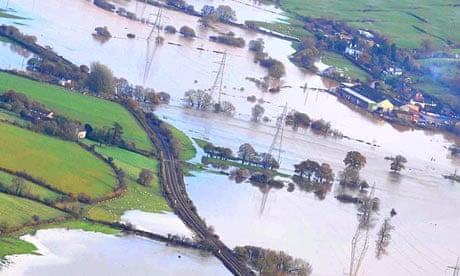
Government statement
The government will make a statement on the flooding in the Commons this afternoon.
George Osborne will make a statement announcing the name of the new governor of the Bank of England at 3.30pm; after that David Cameron will make a statement on the recent EU summit; after that will come the flooding statement, perhaps around 5pm.
Insurance
At the No 10 lobby briefing this morning, Andrew Sparrow reports, David Cameron's spokesman said a government proposal to resolve the dispute between ministers and insurers over flood risk had been sent to the Association of British Insurers at the end of last week. But a spokesman for the ABI has denied this, telling Andrew: "There was a ministerial meeting last week to consider the impasse around the industry’s plan but no new proposal was tabled."
Owen Paterson
Owen Paterson, the environment minister, is being interviewed on BBC Radio 4's World at One at the moment.
He says the Association of British Insurers' timing in bringing up the insurance negotiations was "unhelpful" and in danger of alarming people.
He is in Kennford, near Exeter. Here is a dramatic picture from that village:
Look how high the water came here in Kennford. And it was black because it was full of oil... twitter.com/jonkay01/statu…
— Jon Kay (@jonkay01) November 26, 2012
North Yorkshire
Fire crews are using a high volume pump to try to prevent flood water disabling a hospital in North Yorkshire, reports Martin Wainwright.
The Friarage in Northallerton, the county town, is threatened by overflow from neighbouring Willow Beck which could reach electric controls and the boiler room.
A spokesman for North Yorkshire fire service said: "We are concerned the beck may overtop the banks and risk flooding parts of the hospital." The Friarage has been in the news recently because of health service plans to move children's services and maternity to Middlesbrough.
North Yorkshire council agreed last week to ask the health secretary, Jeremy Hunt, to "call in" the proposals by the local Hambleton, Richmondshire and Whitby clinical group. They describe continuing the services at Northallerton as financially "unsustainable".
North Yorkshire is awaiting the worst of the weather this afternoon, with 16 of the 21 flood warnings in the Environment Agency's north-eastern area in the county. Innis Thompson from the agency said: "The rain has started falling again and what we're expecting is some persistent rainfall in North Yorkshire as we go through the day. The Environment Agency is saying to everyone: please be on really full alert about this."
Photos
Here's a picture gallery made up of images tagged #flooding on Instagram powered by n0tice - the Guardian's new community noticeboard tool." Here's one of the pictures:
This article includes content hosted on platform.n0tice.com. We ask for your permission before anything is loaded, as the provider may be using cookies and other technologies. To view this content, click 'Allow and continue'.
Cuts
David Cameron's cuts to spending on flood defences are going to leave him in very deep water, argues Damian Carrington.
As I revealed earlier this summer, the cuts have meant that at least 294 flood defence schemes that were in line for funding have not been built. That clearly has a direct impact: fewer homes are protected than expected. But it also means flood home insurance premiums for those most at risk will soar or, at worst, that those homes will be completely uninsurable ...
Everyone, including ministers, agrees that climate change is ramping up the risk of flooding in the UK as rainfall comes in more intense bursts. It will be the most damaging impact of global warming in the UK. Yet the coalition cut funding by over 25% - hundreds of millions of pounds - on taking office.
Cumbria
Cumbria and the Lake District, which have taken so much punishment from flooding in recent years, are hoping to stay just north of the main front of rain, Martin Wainwright reports, allowing emergency teams to mop up after yesterday's damage.
Traffic to Sellafield nuclear complex was warned to avoid the coastal roads and keep to the main A595 after a roll-call of small towns and villages – Egremont, Blackbeck, Parton and Calderbridge – saw side roads closed while the B5345 link to St Bees on the coast was inundated.
Minor flooding returned to Carlisle, which has been given major extra defences since the very serious damage caused in 2005, and Scalegate Road was only just passable. Other areas in Cumbria affected by minor floods which have since abated are Blennerhasset, Arkleby and Gamblesby near Penrith, where firefighters dug trenches to divert river water from the old smithy.
Cumbria is familiar with heavy rain and is well-watered by rivers including the Bela, Brathay, Cocker, Derwent, Duddon, Eamont, Eden, Greta, Irt, Kent Lowther, Petteril, Rothay, Wampool and Winster, all of which have had flood alerts.
This article includes content provided by Google Maps. We ask for your permission before anything is loaded, as they may be using cookies and other technologies. To view this content, click 'Allow and continue'.
Wales
In Wales, Labour is in charge, meaning Tory shadow ministers argue against budget cuts, a strange reversal of roles to anyone more used to following UK politics.
Russell George, the Conservative shadow environment minister, in Wales, has put out an email complaining about the Welsh government's planned £30m cuts to the budget for coping with flooding and coastal erosion. George said:
The flooding we’ve seen over the last few days should act as a wake-up call for the Welsh government. It is incumbent upon ministers to deal with the constant threat being posed and cutting the budget for dealing with the problem doesn’t make sense.
Welsh ministers have blamed reduced funding from the UK Treasury for the cuts.
Reader Paul Allen Morris sends in this picture of a flooded rugby pitch:
@guardian #NovFlooding Somerset/Wiltshire flooding twitter.com/PaulAllenMorri…
— Paul Allen Morris (@PaulAllenMorris) November 26, 2012
This article includes content hosted on metoffice.gov.uk. We ask for your permission before anything is loaded, as the provider may be using cookies and other technologies. To view this content, click 'Allow and continue'.
David Cameron
David Cameron has been tweeting about the floods again this morning:
My thoughts are with those affected by flooding - ensuring Govt doing all it can. Visit Environment Agency bit.ly/vgtPjg to see risks
— David Cameron (@David_Cameron) November 26, 2012
North Wales
Photos sent to our Flickr stream show the extent of the flooding in Llanberis, north-west Wales.
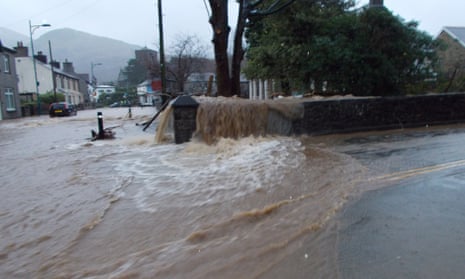
This map shows where Llanberis is:
This article includes content provided by Google Maps. We ask for your permission before anything is loaded, as they may be using cookies and other technologies. To view this content, click 'Allow and continue'.
Owen Paterson
Owen Paterson, the Tory environment secretary, has just been interviewed by BBC News in front of a raging River Ex in Exeter. He said the government, police, fire brigade and Environment Agency had all been working hard to deal with the effects of the floods.
He said in general flood defence schemes had worked well. Asked about a partial failure of the new Worcestershire flood defences, he said:
I understand there was an electricity problem, which tripped out, and that's now been fixed ... We have got a very large number of schemes across the country which are working and are saving people's properties and businesses.
He stressed that people in areas that may be affected today should keep themselves up to date on the Environment Agency website.
Paterson was also asked about the public row the insurance industry has opened with the government over flooding (see earlier), and denied there was deadlock between the two sides: "No, emphatically not."
I haven't come down here to negotiate with ABI [Association of British Insurers] over the airwaves ... I have been holding talks with the ABI; actually the first serious meeting I had was within two days of coming to office. We are emphatically continuing to talk to them. We had meetings last week. We are looking forward to their latest proposal.
But it's opportunistic to try to get me to negotiate over the airwaves, and I'm not going to ... ABI can talk to me back in London, and we'll continue to do so. We are determined to arrive at a satisfactory solution, but today's the day for local people down in the south-west so they can get their views across to me so I can take them back to my other colleagues in cabinet and get things done with practical help today.
Asked about fears of insurance premiums being pushed up for everyone when a flood deal is reached with the insurers, Paterson said:
This is a very complex problem, which I've come into, as I said, I think within two days of coming to office I had a meeting with the ABI. We want to arrive at a solution which delivers as comprehensive a service as possible, which is affordable, and which does not bear a huge cost on the taxpayer.
He said he was worried about the north of England and north Wales, and called the bad weather "exceptional".

My colleagues on the picture desk are putting together this live blog of photographs of flooding throughout the country.
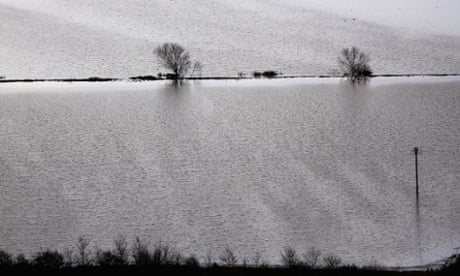
Steven Morris reports from Worcestershire:
Interesting thoughts from the Environment Agency's Roy Stokes in Worcestershire - rivers not as high as 2007 and not as many homes hit....
— steven morris(@stevenmorris20) November 26, 2012
...but Stokes says flooding has been so widespread that the perception is it is even worse.
— steven morris(@stevenmorris20) November 26, 2012
Tewkesbury
Tewkesbury in Gloucestershire is frequently hit by flooding, and was particularly badly hit in 2007. It has been hit again this weekend, as this dramatic picture shows.
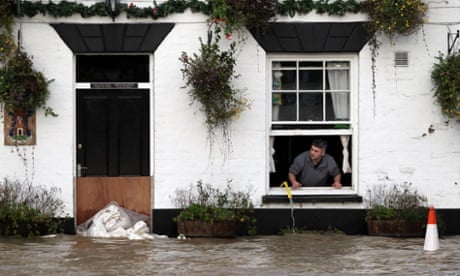
Guardian photographer Christopher Thomond reports that an Environment Agency spokesman has been telling Radio Sheffield that south Yorkshire and Derbeyshire look likely to escape the worst, but north Yorkshire and the north-east are unlikely to be so lucky.
How is flooding and bad weather affecting your part of the UK? Show us by adding a picture to our Flickr group - make sure your picture is located on the map - or you can tweet us your pictures with your location (town or postcode) @Guardian with the hashtag #Novflooding. We'll plot the images you share with us on a collaborative map to show how the weather is affecting people across Britain.
Northern England
Martin Wainwright reports from Leeds that downpours may see 40-50mm of rain fall in the next 24 hours as the wet weather reaches Lancashire and Cumbria and then crosses the Pennines, gaining in intensity.
The Environment Agency has 16 flood warning and 39 flood alerts in the north-east and Yorkshire and one warning and 14 alerts in the north-west, with 21 areas in the north-east and three in the north-west back to normal after previous warnings. All are areas familiar with flooding after heavy rainfall including Keswick campsite in Cumbria, the Ouse in central York and the Derwent at Stamford Bridge, site of the celebrated battle in 1066.
Earlier downpours closed several major roads in the north for periods yesterday and overnight including the A668 at West Auckland and Crook, along the Cumbrian coast at Egremont and at Parbold in Lancashire. The A19 from the A1M to Teesside has also been affected.
The economic cost of such closures has been highlighted by the estimated £250m lost to business from the three-day closure of the A1M because of flooding in September. The total dwarfs the £30m budgeted by the government for flood relief and defences in Yorkshire next year.
The Meteorological Office forecasts continuing rain for the rest of the day over much of the north, persisting overnight and only easing at dawn when the front will move off, leaving a trail of scattered showers. The weather is then expected to turn dryer and colder with snow likely on high ground before the weekend.
My colleague Mark King has written this excellent piece explaining what to do if your home is at risk of flooding:
There is a flood alert for my area. What should I do?
Tune in to the local radio station so you can keep up with what is going on and to check the local weather forecast. It might be sensible to locate a battery or wind-up radio in case the power supply is hit.
Prepare a flood kit: home insurance documents, torch, warm waterproof clothing, first aid kit and prescription medicine, bottled water and non-perishable food, baby food and care items.
Think about who will need help to get out of danger, including vulnerable neighbours and pets.
The alert has changed to a warning – what now?
Turn off your gas and electricity. Move family, pets, important and precious items (including other insurance policy documents, birth certificates etc) to a safe position (the highest floor/attic).
Put any flood protection products you have in place, including airbrick covers, floorboards (to fit around windows and doors), sandbags (stuff pillow cases or plastic bags with earth if you don't have sandbags) and sink and bath plugs weighed down by heavy objects to stop water coming up the pipes.
If there is time also move other items such as expensive furniture, electrical equipment, lightweight rugs and carpets to the top floor in the house, and move your car to higher ground.
Plug water inlet pipes with towels or cloths, and disconnect any equipment that uses water.
Mark also explains how to claim on your insurance.
Insurance
Those whose homes have already been damaged and those fearing damage today will be also facing worries about their insurance policies, now and in the future.
The Times reports today (£) that talks between the insurance industry and government ministers over insuring those in high-risk areas are “on the brink of collapse”.
Insurers agreed a statement of principles with the government in 2008 to renew cover – usually at a very high premium and with an even higher excess – for flood victims. This agreement runs out on 30 June 2013 and householders then face being refused insurance unless the government and the industry come to a new agreement.
The Times’s source, an underwriting director, has told the paper “the industry had been hoping to reach a deal in the past few weeks under which householders in high-risk areas would have to pay an extra £8 to £10 on top of their normal premiums”.
The levy would then be put into a pool worth more than £100m a year, which would be used by insurers to cover floods affecting those homes. But the insurance director said that the industry had asked the government to provide a guaranteed “overdraft” to fund any emergencies in the first two or three years of the scheme, before the fund had been built up. The loan would be paid back in future years by the industry, if necessary through raised premiums.
A meeting last Thursday between the Department for Environment, Food and Rural Affairs and insurers failed to break the deadlock.
The Times reports that insurers paid out £3bn after the devastating 2007 floods, and are expecting a bill of £500m this year. Each claim averages £20,000-40,000, the paper reports.
The Times’s source claims that if the talks with the government do break down, frequently-hit areas such as Tewkesbury and Cornwall might end up being uninsurable.
Defra told the paper it was “working very hard with the industry on this complex issue”.
On BBC Radio 4’s Today programme this morning Nick Starling of the Association of British Insurers said the talks had reached “crisis point”. “The government has made it clear it's rejected our solution,” he claimed.
Richard Benyon, the minister for natural environment, water and rural affairs, said the government was “really determined” to reach a deal, and attacked the industry for raising the issue in the middle of the present crisis. "I think it is actually rather demeaning at this particular moment in time to be talking about this.”
He said he was not willing to continue the negotiations live on air.
Benyon added:
What we are talking about on insurance is an absolute priority for our department but at the moment we are dealing with flooded properties and I really want to concentrate on that …
[Victims] need to know that we want to find a solution which is an agreement between government and the insurance industry that provides insurance that is universally available, is affordable.
That is our absolute priority. The new secretary of state, Owen Paterson, it was the first meeting he had on coming into post. It is an absolute priority for me as well. To say there is deadlock is not right.
He detailed some of the financial issues that were holding up the negotiations:
We don't want to see a huge burden going on insurance premiums across the country. We want to make sure there is not some bottomless pit of government funding that highly-profitable financial organisations can tap into.
We want to make sure that we are looking after the taxpayer, that we are finding a solution that means insurance is universally available, that makes sure it's affordable to those on low incomes.
The Met Office has issued amber rain warnings ("be prepared") for the following locations:
North-east England, Wales, Yorkshire & Humber
and less-severe yellow warnings ("be aware") for:
East Midlands, London & south-east England, north-east England, north-west England, south-west Scotland, Lothian Borders, south-west England, Wales, West Midlands, Yorkshire & Humber.
Hello and welcome to the Guardian’s live coverage as the bad weather that has caused such damage in the south-west and the Midlands moves up the country. The north of England and north Wales are braced for flooding.
My colleague Steven Morris rounds up the latest here.
The Met Office was expecting 40mm of rain to fall widely, with up to 70mm in some places – the sort of levels that have been causing severe flooding in Cornwall, Devon, Gloucestershire and Worcestershire.
Forecasters say southern England and the Midlands are not yet off the hook as heavy showers may continue. Flood defences will be tested further as water pours off the hills into streams and rivers. More than 800 homes and business premises have already been flooded.
Eddy Carroll, the Met Office chief forecaster, said: "The heaviest and most persistent rain into Monday is expected to be over parts of northern England and north Wales.
"Here we can expect between 30 and 40mm of rain falling in many areas and up to 70mm of rain in parts of north-east England, continuing the risk of further flooding and travel disruption."
We’ll have live coverage here throughout the day.
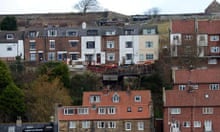

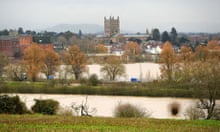
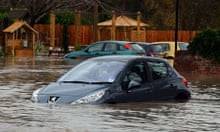
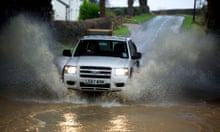
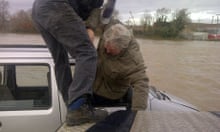
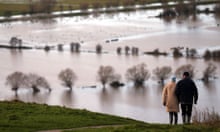
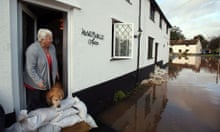
Comments (…)
Sign in or create your Guardian account to join the discussion